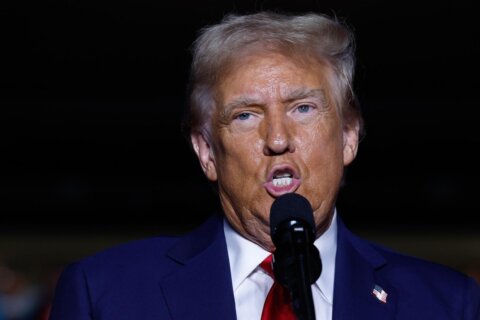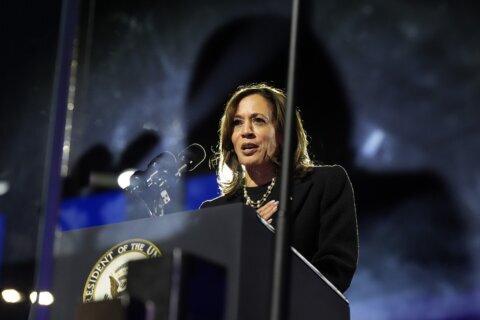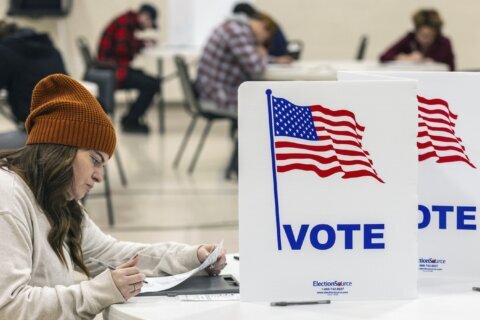Voters asking questions at Democratic presidential campaign events don’t often profess their love for Donald Trump or privately weigh whether to support a Democrat or the President in 2020.
But most Democratic events are not like Tulsi Gabbard‘s town halls.
The Hawaii congresswoman has proven resilient in the Democratic field, weathering low poll numbers and attacks from top Democratic figures like former Secretary of State and 2016 Democratic presidential nominee Hillary Clinton. A key reason for that resilience: Gabbard’s unique candidacy centered on New Hampshire, where she is actively reaching out to a broad coalition of devout liberals, dismayed independents and questioning Republicans.
Gabbard sprinkles her stump speech with nods to unity and talks about how she wants to build a bridge between the parties. She regularly attacks both Democratic and Republican orthodoxy, particularly on foreign policy, and casts herself as someone who understands the system but wants to disrupt it, an argument that drew voters to Trump four years ago. The congresswoman decries the tenor of politics — “hyper partisan divisiveness getting in the way of progress,” she said this week — and, when asked about impeaching Trump, Gabbard expressed skepticism.
“I have had concerns for a long time about impeachment being pursued for partisan reasons,” Gabbard said, noting that she did vote to authorize the impeachment inquiry. “Pursuing impeachment for partisan seasons is something that will only further divide an already divided country and it actually undermines our democracy.”
She added: “I am undecided on how I am going to vote.”
This is exactly what many at Gabbard’s events want to hear, especially the number of independents and Republicans who are currently weighing whether to back a Democrat or cast their second vote for Trump.
The congresswoman — seemingly in a nod to those voters — often tells a story about how, when she first arrived in Congress in 2013, she leaned on her mother to make macadamia nut brittle for every other member of Congress and their staffs as a way to make connections with people from the opposing party.
“It’s not rocket science,” she said at a Rotary Club meeting in Nashua. “This is the key in how we can begin to build these bridges, on how we can once again unite around this mission of service.”
Gabbard’s supporters embrace this message, seeing it as a sign that the Hawaii Congresswoman is less partisan than her 2020 opponents. And the audience at Gabbard’s town hall prove how successful the congresswoman has been in her outreach to more than just loyal Democrats.
Brandon Chamberlin, a health care executive who voted for Trump in 2016, said he is actively considering Gabbard but will “most likely” vote for Trump again is Gabbard fails to win the Democratic nomination.
“She has a strong voice for the people,” Chamberlin said, comparing that to Trump’s 2016 message and their desire to “disrupt the status quo.”
Chamberlin is not alone, either.
A questioner at one of Gabbard’s events said that he would like to see Trump win reelection in 2020 and then Gabbard win the presidency in 2024. Another told CNN that their primary concern is lawmakers trying to infringe on Second Amendment rights.
And then there are supporters like Chris Ward, a software engineer from Nashua who reluctantly voted for Trump in 2016 but laments what he sees as decaying credibility in the White House. Ward said he doesn’t want to vote for Trump again.
“I have been voting for President since 1996 and I very rarely find someone that I am voting for, I always feel like I am voting against somebody,” Ward said. “In the last election, I didn’t know who to vote again. I didn’t like either of them. Tulsi is one of the first candidates that I have ever met that I support. … I have never felt that way before.”
These voters are drawn to Gabbard’s outsider message.
Days before the lineup for the Democratic National Committee’s December debate was announced and facing the real prospect that she would not qualify for the contest, Gabbard tweeted that she won’t show up — whether she qualifies or not.
“For a number of reasons, I have decided not to attend the December 19th ‘debate’ — regardless of whether or not there are qualifying polls,” she wrote.
All in on New Hampshire
It’s voters like Chamberlin and Ward that are propelling Gabbard in New Hampshire, where the congresswoman is over-performing her support in other early nominating state or nationally.
Polls show Gabbard with single-digit support in New Hampshire, but those same polls find that the congresswoman is garnering more support from independents and conservatives than Democrats and liberal voters. A Quinnipiac poll released in November found that among likely Democratic primary voters, Gabbard is the first choice for 10% of voters who self-identify as independent and 9% of those who self-identify as moderate or conservative.
That standing in New Hampshire explains why Gabbard has made the state her focal point.
While the congresswoman has not been to Iowa since October, she — according to local event trackers — has done more than 50 events in the Granite State, making her one of the most present presidential Democrats there.
Gabbard has begun to spend so much time in New Hampshire that the campaign is now renting a house in the state to make it easier for the congresswoman to make frequent, repeat visits.
The amount of time she has spent in the state even caused the Rotarian who introduced her on Monday to label Gabbard a “New Hampshire resident” who is “living in the state.”
(The congresswoman’s spokeswoman points out that Hawaii is still home for Gabbard).
In addition to the new house, Gabbard’s family is now surrounding her in New Hampshire. Her sister is her top aide and body woman, while her husband is doing everything from advising the candidate to filming her events.
The goal: Motivate people like Nick Barbarian and Brian Gordon, two irregular voters, to support Gabbard in the primary.
Sporting an “Unusual Americans for Tulsi” T-shirt, a long brown beard and tattoos across his head and face, Barbarian said he liked “everything about” Gabbard.
“I have never voted in my life. This will be a first for me,” he said. “I haven’t like anything I saw so, rather than settle, I just waited and found what I was looking for.”
Gordon, a former Republican voter who hasn’t voted for a major party since 2004, stood next to Barbarian, nodding.
“I think a lot of politicians speak about being transparent and I think she actually is a transparent politician,” Gordon said. “I think we have lost control of our democracy as a people and I think she is somebody who can bring that back.”
The Clinton bump
Gabbard had been a middling presidential candidate for months when Hillary Clinton went on a podcast and charged that the congresswoman was being groomed for a third-party run and was a favorite of the Russians.
It was a substantial charge and Gabbard responded by demanding Clinton, who stood by the comment given reports that Russian trolls had been helping the congresswoman’s campaign, retract the comment.
Gabbard told CNN that Clinton’s comment has cut both ways for her campaign.
“It’s hard to say,” she said. “Some people are saying, ‘Hey, look, your polls have jumped.’ But we’ve also seen negatives go up. Where previously people were not asking me about Russia, and now some people coming and saying, ‘This is a very real concern.'”
The attack, however, appeared to help more than harm Gabbard, who saw a noticeable bump in polls following the Clinton kerfuffle.
And for people like Derek Larsson, a Massachusetts voter who crossed into New Hampshire to see Gabbard in Nashua, the spat with Clinton was all the validation he needed to confirm his support for the congresswoman.
Larsson, who sees both Gabbard and Trump as people “outside the system” who could step in and “look at it with a critical eye,” said he would consider voting for Trump again, especially if Gabbard is not the nominee.
“I am not a fan of Hillary Clinton. I think she is a very corrupt individual,” said Larsson, who, after supporting Bernie Sanders in the 2016 primary, crossed party lines and voted for Trump in the general election. “I think the attack helped her to stay on message and by attacking Hillary Clinton, she is staying on message.”







